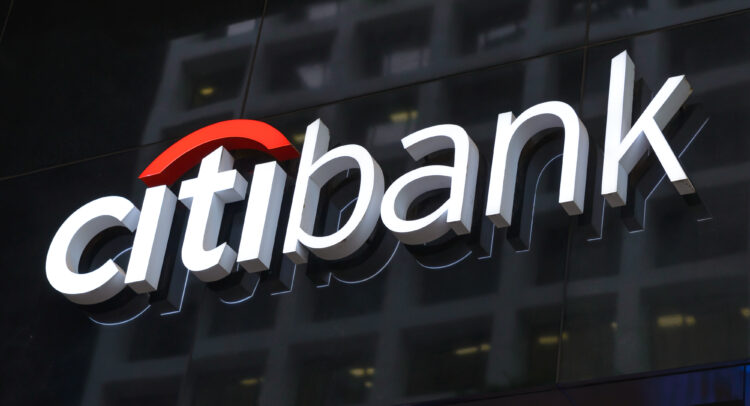Are you panic-selling bank stocks? I invite you to stay calm, as Citigroup (NYSE:C) is a mega-banking name to consider. I am bullish on C stock for multiple reasons, including Citigroup’s terrific earnings track record, low valuation multiple, and juicy dividend yield.
Pick the best stocks and maximize your portfolio:
- Discover top-rated stocks from highly ranked analysts with Analyst Top Stocks!
- Easily identify outperforming stocks and invest smarter with Top Smart Score Stocks
Headquartered in New York, Citigroup has been around in one form or another since 1812 and is one of the largest financial institutions in the world. Investors generally don’t favor banks right now, but when a crisis strikes, cautious traders can follow the “bigger is better” principle.
In other words, Citigroup stock is a sensible pick when everything seems to be falling apart at the seams in the financial sector. A buy-on-the-dip investment today requires courage and an iron stomach, but C stock could provide outstanding returns when the market calms down — which it has always done, sooner or later.

Citigroup Checks All the Right Boxes: Value, Yield, and More
Before we get into a discussion about bank runs and contagion, first, we should remind ourselves why Citigroup stock is a stand-by investment for practically anyone. Whether you’re seeking profitability, value, income, or relative safety in a mega-cap financial-sector asset, C stock fits the bill.
I’m not just saying this because Citigroup is a gigantic bank with brand-name recognition, though this does add a comfort factor for the shareholders. I’m also looking at Citigroup’s vital stats, and the data definitely casts Citigroup in a positive light.
First and foremost, Citigroup is consistently profitable and has beaten consensus earnings-per-share (EPS) estimates every quarter since mid-2020. That’s quite a feat, considering interest-rate hikes have crimped lending and borrowing activity during the past year.
Also, if you’re looking for some yield, C stock should be right up your alley, then, as Citigroup’s 4.4% trailing dividend yield easily outpaces the sector average of 2.114%. Further, the fact that Citigroup didn’t enact any major dividend cuts during these challenging macroeconomic times is certainly a good sign.
What about value investors, though? No worries — I’ve got you covered. Citigroup’s trailing 12-month GAAP-measured P/E ratio of 6.29x is quite reasonable, especially compared to the sector median P/E of 9.46x. In other words, C stock looks like a prime bargain, ready for the picking.
Flight to Safety amid Contagion Fears Could Benefit Citigroup
Since SVB Financial Group’s (NASDAQ:SIVB) subsidiary Silicon Valley Bank (SVB) imploded recently, the financial headlines have focused on fears of contagion and failure throughout the U.S. banking sector. There’s no denying that some regional banks that over-leveraged themselves with bond investments might be in trouble. However, people aren’t just going to stop using banks, and they’re likely to seek shelter in famous large banks like Citigroup.
I’m not just making assumptions here. According to the Financial Times, “Large US banks” are being “inundated with new depositors as smaller lenders face turmoil.” Furthermore, the Financial Times identified Citigroup as one of the big banks “being inundated with customers wanting to transfer funds from smaller lenders,” while Bloomberg observed that Citigroup is “seeing higher-than-usual volume” in transactions.
What about the “contagion risk” that so many investors are talking about, though? Could Citigroup get caught up in a wave of bank failures and become the next Lehman Brothers or Bear Stearns?
As an investor, you have an important decision to make at a time of peak fear. Sure, you can give into the fear and sell all of your bank stocks if you’re really worried about “contagion risk.” Alternatively, you can capitalize on this rare “blood in the streets” moment in big-bank stocks.
Bear in mind, even during the financial crisis of 2008 to 2009 that involved Lehman Brothers and Bear Stearns, the federal government (with bipartisan support, by the way) identified six big banks, including Citigroup, as “systemically important financial institutions.”
Thus, Citigroup was effectively deemed too big to fail by the government’s plunge-protection team. As savers seek out safe places to park their capital, when all is said and done, politicians will likely protect mega-banks like Citigroup from failure.
Is Citigroup Stock a Buy, According to Analysts?
Turning to Wall Street, C stock comes in as a Moderate Buy based on four Buys, five Holds, and one Sell rating. The average Citigroup stock price target is $57.40, implying 21.3% upside potential.

Conclusion: Should You Consider Citigroup Stock?
Sometimes, bigger really is better. Citigroup would probably get backstopped by the government if contagion actually spread throughout the banking sector. Maybe it’s not fair, but investors must always be realistic.
Citigroup isn’t SVB and likely won’t collapse anytime soon. Besides, Citigroup offers investors a stellar triple threat of value, profitability, and yield. So, feel free to take advantage of low prices in bank stocks, and consider a long position in C stock.



















